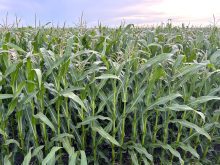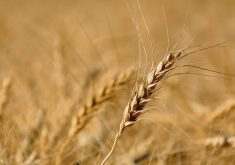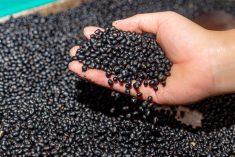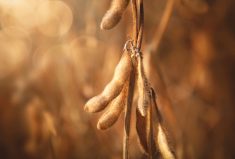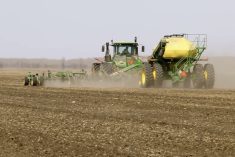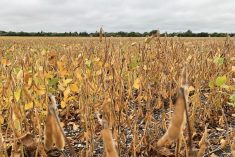The association for Ontario corn and soybean growers is “evaluating several options” after its request for a stay of the province’s new limits on neonicotinoid seed treatments was rejected.
The Ontario Superior Court denied the request from Grain Farmers of Ontario (GFO) for a stay and interpretation on the neonic regulations, which became law in July.
If a stay had been granted, the regulations would have been subject to further review, according to GFO in August.
GFO had asked the court to delay implementation of the regulation until May 1, 2016, or “such time as the requirements of the regulation can reasonably be met.”
Read Also

Wheat breeding system no longer works, Canadian Wheat Research Coalition report says
A Canadian Wheat Research Coalition report, published Feb. 26, says the status quo is not an option for Canada’s wheat breeding system. It must be transformed, by farmers.
“We are extremely disappointed that the judge did not rule in our favour, leaving the grain industry in a very difficult situation as farmers try to arrange seed orders this fall,” GFO chair Mark Brock said in a release Friday.
The association, he said, is “currently reviewing our legal options and will continue to protect the rights of Ontario’s grain farmers.”
Ahead of its court hearing on Sept. 28, GFO emphasized to its corn- and soy-growing membership that the new neonic regulations are still law, and farmers will “need to educate themselves on compliance.”
Pest assessment
The new neonic regulations were set up this summer to meet the province’s stated target of reducing use of neonicotinoid-treated corn and soybean seed by 80 per cent by 2017, allowing the pesticide-treated seed to be used “only when there is a demonstrated pest problem.”
The regulations set up the neonics — imidacloprid, thiamethoxam and clothianidin — in a new pesticide class, Class 12.
Between now and the end of August 2016, any Ontario corn or soy grower wanting to plant Class 12-treated seed on more than 50 per cent of his or her acres must complete a soil inspection pest assessment report.
After August 2016, a corn and/or soy grower wanting to use any Class 12-treated seed at all must complete a pest assessment report and present his or her certificate in integrated pest management (IPM) training. The province is picking up the tab for IPM classes until September next year.
Pest assessments beyond August 2016 must be done either via a soil inspection by an IPM-certified grower or professional pest advisor, or via a crop inspection by a professional advisor.
Ontario set up its neonic regs citing evidence that the Class 12 pesticides are “highly toxic to honeybees and other beneficial insects,” and could also harm aquatic insects if they run off soils into nearby watercourses. — AGCanada.com Network



